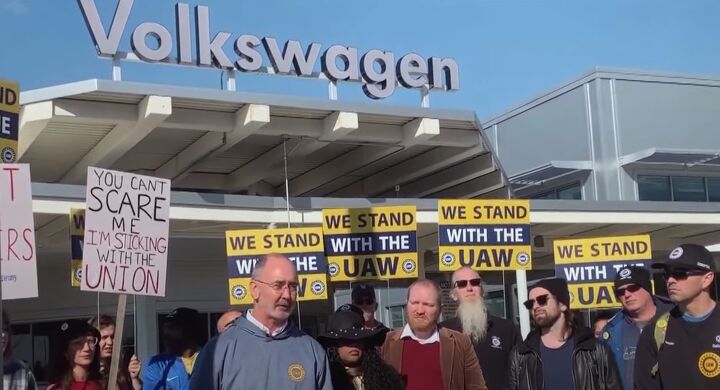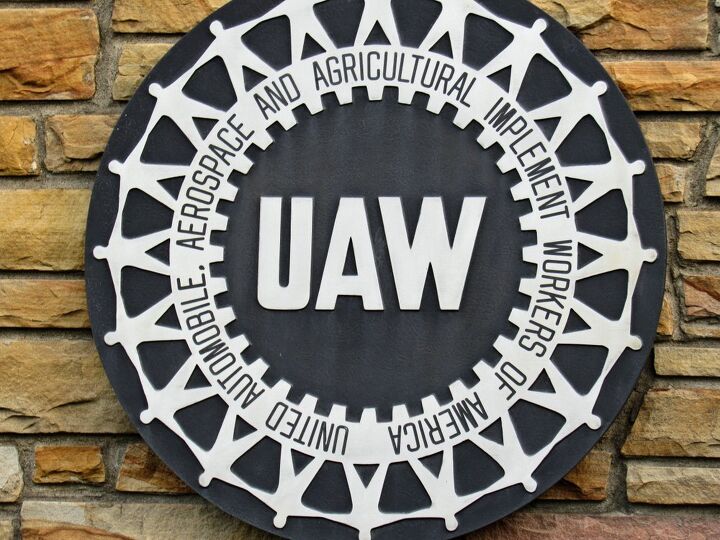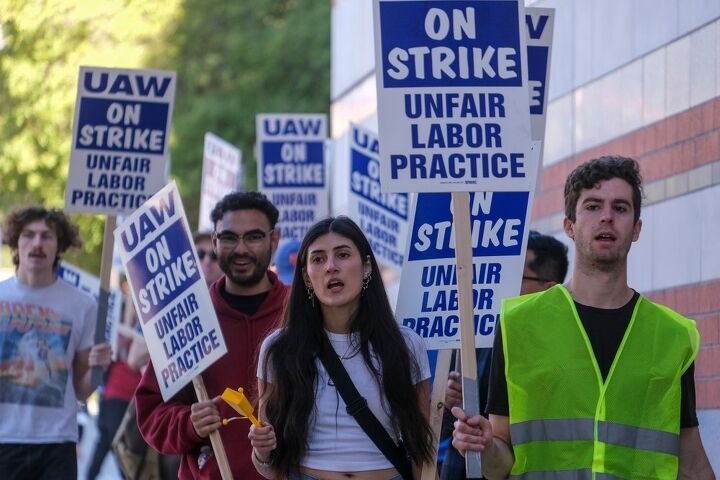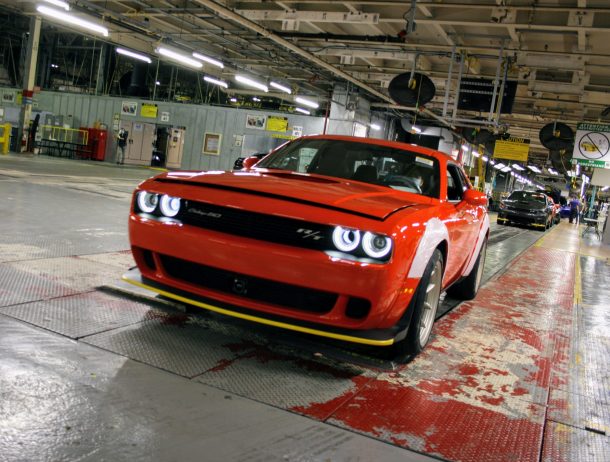#Labor
UAW Announces Volkswagen Workers Filing for Unionization Vote in Tennessee
Volkswagen employees in Chattanooga, TN, have filed a petition with the National Labor Relations Board for a vote to join the UAW. Clearly pleased, the union shared this world with the news on Monday to be accompanied by the requisite media agitprop.
This will be the first time a non-union automotive plant has filed for a union election in quite some time. The UAW called it a “grassroots effort” following the UAW’s previous contract negotiations with Ford, General Motors, and Stellantis.
UAW Strikes Slated to Expand Next Week
America’s automotive union has committed itself to expanding strikes if leadership feels meaningful progress has not been made by the end of this week. UAW President Shawn Fain has said more factories would be called up to picket if the state of contract negotiations are still deemed lacking on Friday.
While the union hasn’t indicated which (or how many) facilities would be joining the strike, messaging from the UAW has tried to convey to the public that it’s serious about having its demands met and will do whatever it takes to reach its contract goals.
UAW Cites Slow Negotiations as Strike Continues, Snubs Politicians
Contract negotiations between Detroit automakers and the UAW resumed over the weekend with union leadership signaling that little progress had been made. Despite Stellantis having matched the 20-percent raises offered by GM and Ford over the weekend, UAW President Shawn Fain has said the overall agreements remain unsatisfactory.
As mentioned in our earlier coverage, the union is seeking a 40 percent raise across the board through 2027 — resulting in roughly $25 an hour (around $52,000 per year) for starting employees. Some of the benefits, many of which had been rolled back as concessions during the 2008 financial crisis, are also sticking points. Fain wants workers to see those benefits restored, claiming the industry can easily afford them.
UAW Seeking Friends in Washington DC, Threatens to Withhold Biden Support
UAW leadership headed to Washington last week to drum up support from politicians as it engages in contract negotiations with Detroit-based automakers. While this has often been the status quo for the union, UAW President Shawn Fain has suggested the government would help ensure a fair deal with the automotive industry.
While union leadership has opted to meet with the usual roster of Democrats, it has said it would withhold support of Joe Biden’s reelection campaign if it didn’t think the White House would be offering the kind of help it needs.
Ohio Battery Strikers Reject Second UAW-Negotiated Deal
The strike at the Clarios battery plant in Holland, Ohio, is reportedly ongoing after workers rejected a deal struck between the company and negotiators from the United Auto Workers union. Roughly 550 employees represented by UAW Local 12 walked out on May 8th over changes to overtime eligibility and production incentives, with a select few picketing outside the factory entrance.
Report: Ohio Court Orders Limited UAW Picketing
A little over a week ago, a few hundred workers went on strike at the Clarios battery plant in Holland, Ohio, over failed labor negotiations. While picketing is standard practice for UAW members dissatisfied with their contracts, the Lucas County Court of Common Pleas issued the restraining order on Friday to prevent striking workers from disrupting business operations and creating an allegedly unsafe environment.
GM Says Labor Disputes Are Making South Korea Look Unmanageable
Over the last few years, General Motors has been cautiously hinting that it wants to pull out the Korean market. In 2018, the automaker started worrying about regional bankruptcy and shuttered one of its South Korean facilities after noting that labor costs had been on the rise. While the government handed GM 850 billion won ($712.85 million) in industrial aid to stick around, the region is known for labor disputes. We even celebrated the fact that South Korean Hyundai failed to strike in 2019. General Motors was less fortunate, however.
The Detroit-based company is once again discussing abandoning the market and citing labor issues as the primary cause. Employees have been organizing limited daily strikes since October 30th. Despite only lasting part of a single shift, it’s impacting production and will only end once the automaker ends a wage freeze enacted during the aforementioned deal in 2018.
Detroit Three Strike Target ID'd Tuesday; Unifor Looks to Bring Public Cash Onside
With its members having recently voted to strike if bargaining teams don’t make headway, Canadian autoworkers union Unifor plans to reveal its first target next Tuesday. Contract talks kicked off last month, with Unifor aiming to maintain, at the very least, the current complement of Detroit Three workers north of the border.
With the auto industry in continued retreat in Canada, Unifor knows that the next four years could be the term in which one of the Detroit Three ceases to manufacture vehicles on Canuck soil. What’s left in the country is starting to look threadbare and futureless. Maybe some public cash will sweeten the landscape?
Report of Forced Labor Has Automakers on the Defensive
In a report that harkens back to the grim days of World War 2-era Germany, several automakers are accused of benefiting from forced labor.
An Australian think tank claims upwards of 80,000 Uighurs, a persecuted ethnic minority in northwest China, have been transported from state-run re-education and internment camps to the factories of Chinese suppliers. Among the companies said to benefit from the forced labor are Apple, Sony, Nike, Volkswagen, BMW, and General Motors.
At Audi, EV Push Comes With a Side of Job Cuts
Like parent Volkswagen, premium auto brand Audi is embarking on an electrified journey and, like VW, it would prefer to see the route paved with profits. A difficult task, given the expense of developing such powertrains and the currently limited public demand for the vehicles they power.
Still, Audi is determined to see it through, hoping that one day, perhaps at the mid-point of the coming decade, it will be able to turn a healthy profit off of EVs in a marketplace that’s more receptive of the technology. To get to that promised land, the company will need to free up cash, and it plans to find that dough in its labor costs.
Expect cuts, the company claims.
GM Strike Update: Contract Votes Reveal a Divided UAW Membership
Voting is ongoing among UAW locals this week as the union attempts to put a contract deal in place between its members and General Motors.
Thus far, the voting process has been met with mixed emotions, with one assembly plant opting to reject the proposal. Outside that plant, the ongoing GM strike was marred by the death of a picketing plant worker.
Tentative GM Agreement Details Revealed, UAW Council Deliberates
After reaching a tentative agreement with General Motors on Wednesday, the United Auto Workers has released a summary of the proposed labor contract.
Contained within are wage hikes for GM autoworkers, lump sum increases, a generous signing bonus, the removal of caps on profit-sharing payouts, and a health care plan that maintains the status quo. It would also keep one previously doomed assembly plant open.
What we don’t know, at this point, is when the ongoing strike will end.
Striking UAW Workers' Healthcare Now Back on GM's Tab
As reports point to progress in efforts by General Motors and the UAW to reach a tentative collective agreement and resolve the now 12-day-long strike, the automaker has removed a contentious element of the drama. Announced Thursday, GM will resume covering workers’ health benefits.
GM withdrew the coverage early into the strike, forcing hourly workers to go through their union to fund temporary COBRA plans. As one would expect, GM’s about-face hasn’t left UAW all smiles.
The Union Vs the General: Battle Continues As Strike Hits Day Three
The United Auto Workers and General Motors are seeking to repair their fractured relationship, sitting down for talks as the union’s strike against its first bargaining partner enters its third day. Workers walked off the job at the automaker’s numerous U.S. plants at midnight Sunday, with the UAW complaining that a last-minute offer should have been put on the table far earlier.
As reported before, health coverage played a big role in the failure to secure a contract agreement before the midnight deadline. GM ultimately retracted the offer, but it was too late to hammer something out. As talks continue in the background, both sides are wrestling for control of the public’s sympathies.
Contract Talks Restart; UAW Says GM Took Its Sweet Time Coming Up With Something Half Decent
The United Auto Workers claims General Motors waited almost literally till the eleventh hour to toss out a halfway decent offer, but by that time it was too late to bang out an agreement before an 11:59 p.m. Sunday strike deadline.
As talks get underway after GM auto workers hit the streets last night, the level of disagreement between the two sides remains in dispute. What is clear is that GM faces losses of 50 to 90 million dollars a day if the strike continues.






























Recent Comments